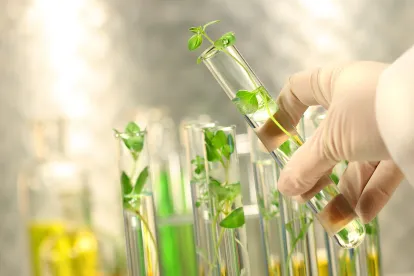The European Commission (EC) announced on March 20, 2024, that it has proposed a series of targeted actions to boost biotechnology and biomanufacturing in the European Union (EU). The EC states that its March 20, 2024, Communication on Building the future with nature: Boosting Biotechnology and Biomanufacturing in the EU “identifies the challenges and barriers and proposes to tackle them, in line with the Communication on the long-term competitiveness of the EU.” According to the EC, the EU biotechnology and biomanufacturing sector faces several challenges: research and technology transfer to the market; regulatory complexity; access to finance; skills; value chain obstacles; intellectual property; public acceptance; and economic security. To address these issues, the EC puts forward the following actions:
- Leveraging research and boosting innovation: To help identify drivers and bottlenecks of innovation and of technology adoption, the EC has launched a study to investigate the EU’s position compared to other global leaders in emerging biotechnology generation and transfer to the biomanufacturing industry. To facilitate a more productive use of research infrastructures, the EC will explore ways to accelerate the development and use of the Industrial Biotechnology Innovation and Synthetic Biology Accelerator (EU IBISBA) as a trusted digital repository and service network for the sector.
- Stimulating market demand: To succeed on the market, biobased products need to prove their lower environmental impact when compared, for instance, to petrochemical products. The EC will review the assessment of fossil-based and biobased products to ensure equivalence of treatment and incorporate methodologies for carbon storage in construction materials. To accelerate the substitution of fossil feedstock and to stimulate the demand and market uptake of biomanufactured products, the EC will conduct an in-depth impact assessment of the feasibility of biobased content requirements in specific product categories and in public procurement. Furthermore, the EC will explore how biomanufactured non-food products could profile themselves better through labeling of biobased products.
- Streamlining regulatory pathways: The EC will assess how EU legislation and its implementation could be further streamlined to reduce any fragmentation, explore potential simplification, shorten the time to market for biotech innovations, and reduce or eliminate regulatory obstacles that arise at national or other governance levels, obstacles that impede an effective single market. The study will lay the foundations for a possible EU Biotech Act. The EC will also work toward establishing an EU Biotech Hub, an operational tool for biotech companies to navigate through the regulatory framework and identify support to scale up, by the end of 2024. The EC will further promote the establishment of regulatory sandboxes that allow testing of novel solutions in a controlled environment for a limited time under the supervision of regulators as a way of bringing more of them quickly to market.
- Fostering public and private investments: The EU has a broad range of financing instruments to support biotechnology and biomanufacturing, such as Horizon Europe, including the Circular Bio-based Europe Joint Undertaking (CBE JU) and the Innovative Health Initiative Joint Undertaking (IHI JU); EU4Health; the Innovation Fund; and now also the Strategic Technologies for Europe Platform (STEP). To develop and scale up innovations with the potential to create new markets, the EC will advocate the inclusion of specific challenges on biotech and biomanufacturing in the European Innovation Council (EIC) accelerator Work Programme 2025. In line with the recent Eurogroup statement on Capital Markets Union, the EC will launch a study by the end of 2024 to identify barriers and ways to support the consolidation of investment funds, stock exchanges, and post-trading infrastructure to enable the development of the necessary scale, enhance the knowledge base, create deeper pools of liquidity, and help lower the cost of financing for high-growth companies.
- Strengthening biotech-related skills: Large-scale and regional skills partnerships can play a significant role in providing upskilling and reskilling opportunities on biotech and biomanufacturing. A specific large-scale partnership for biotech and biomanufacturing could be explored, which can be co-financed through the Blueprint Alliances activity of the Erasmus+ program. The expanding number of dynamic European Universities alliances and Erasmus+ partnerships and alliances for innovation can also strengthen the development of skills required by the biotech sector.
- Elaborating and updating standards: The EC will continue to encourage the elaboration and updating of European standards for biotechnology and biomanufacturing to facilitate market access and innovation.
- Supporting collaboration and synergies: The EC will encourage the deployment of technologies related to biotechnological processes and biomanufacturing across EU regions through relevant Regional Innovation Valleys.
- Fostering engagement and international cooperation: The EC will explore the possibility of launching international biotech and biomanufacturing partnerships with key international partners, such as the United States, India, Japan, and South Korea, to collaborate on research and technology transfer and to explore possibilities for strategic cooperation on regulatory and market access-related topics. Through the Global Gateway and in line with its Global Health Strategy, the EC will advance existing partnerships with Africa, Latin America, and the Caribbean on manufacturing health products aiming to diversify global supply chains, overcome shortages of critical health products, and reduce the global burden of disease.
- Using artificial intelligence (AI) and generative AI: The EC will support structured exchanges with stakeholders to accelerate the uptake of AI, and in particular generative AI, in biotech and biomanufacturing (in the context of GenAI4EU). The EC will also raise awareness of facilitated access to the EuroHPC supercomputers for AI startups and the science and innovation community in the course of 2024.
- Reviewing the Bioeconomy Strategy: The EC will review the EU Bioeconomy Strategy by the end of 2025. The review will take into account the current societal, demographic, and environmental challenges, “reinforcing the bioeconomy’s industrial dimension and its links to biotechnology and biomanufacturing to contribute to a stronger EU economy.”
The EC posted questions and answers and a fact sheet regarding the Communication.




 />i
/>i

